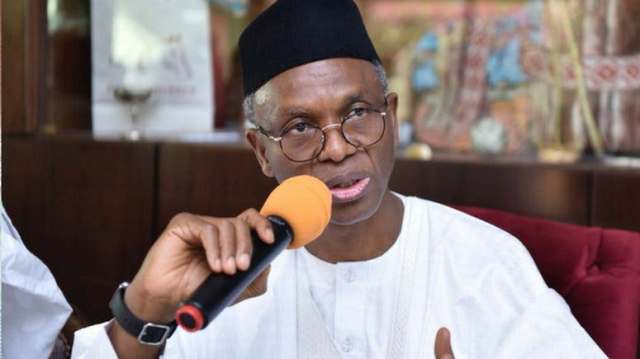Governor Nasir El-Rufai of Kaduna State has fired 99 political appointees.
El-Rufai, who made the disclosure at a media chat with some Kaduna-based broadcast journalists, explained that the disengaged appointees constitute 30 percent of political office holders.
- Bandits who attacked Kebbi College shot students – Witness
- UPDATED: Students abducted as bandits invade Kebbi school
He said the state has started implementing its rightsizing policy but is yet to disengage any state civil servant.
The governor disclosed that only agencies connected to the local government system have disengaged staff and these include the 23 local government councils, SUBEB and the Primary Health Care Board.
“So far, 99 political appointees have lost their jobs but we have not commenced rightsizing civil servants. We want to be fair with regards to civil servants. We had earlier promised that before we reduce the size of the civil service, we will start with political appointees and we have done that,’’ he said.
The governor, who spoke in Hausa, said the rightsizing of civil servants will still go on as planned because of dwindling revenues that is accruing to the state government from the federation account.
‘’However, civil servants with question marks on the veracity of their data have to be given a chance to clear the doubts before any action is taken on them,’’ he clarified.
The governor said his government has employed 11,000 more workers in the health sector, Kaduna State University as well as primary and secondary schools across the state.
The governor disclosed that it is a fallacy to allege that the salaries of political appointees account for the bloated personnel cost of the State Government.
‘’In March 2021, the salaries of these political appointees amounted to N259 million , while civil servants were paid N3.13 billion, aside from costs related to state contributions to pension, accrued rights and other personnel costs. So, it is false to insinuate that political appointees are the ones that guzzle most of the state’s resources,’’ he said.
Justifying the rightsizing of the public service, he said that all states and the federal government are affected by the shortfall of revenue and some states have even reverted to paying the old monthly minimum wage of N18,000.
The governor, however, promised that Kaduna state will not reverse the N30,000 minimum wage that it has started paying.
“We are the first government, federal or state, to pay the minimum wage. We will retain the minimum wage of N30,000 and the consequential adjustments that gave most of our civil servants a 66% salary increase. We will also retain the minimum pension of N30,000 monthly.
“The unified Local Government Service continues to pay the minimum wage, even though they varied the consequential adjustments for their workers below the level for state civil servants,’’ he added.

 Join Daily Trust WhatsApp Community For Quick Access To News and Happenings Around You.
Join Daily Trust WhatsApp Community For Quick Access To News and Happenings Around You.


